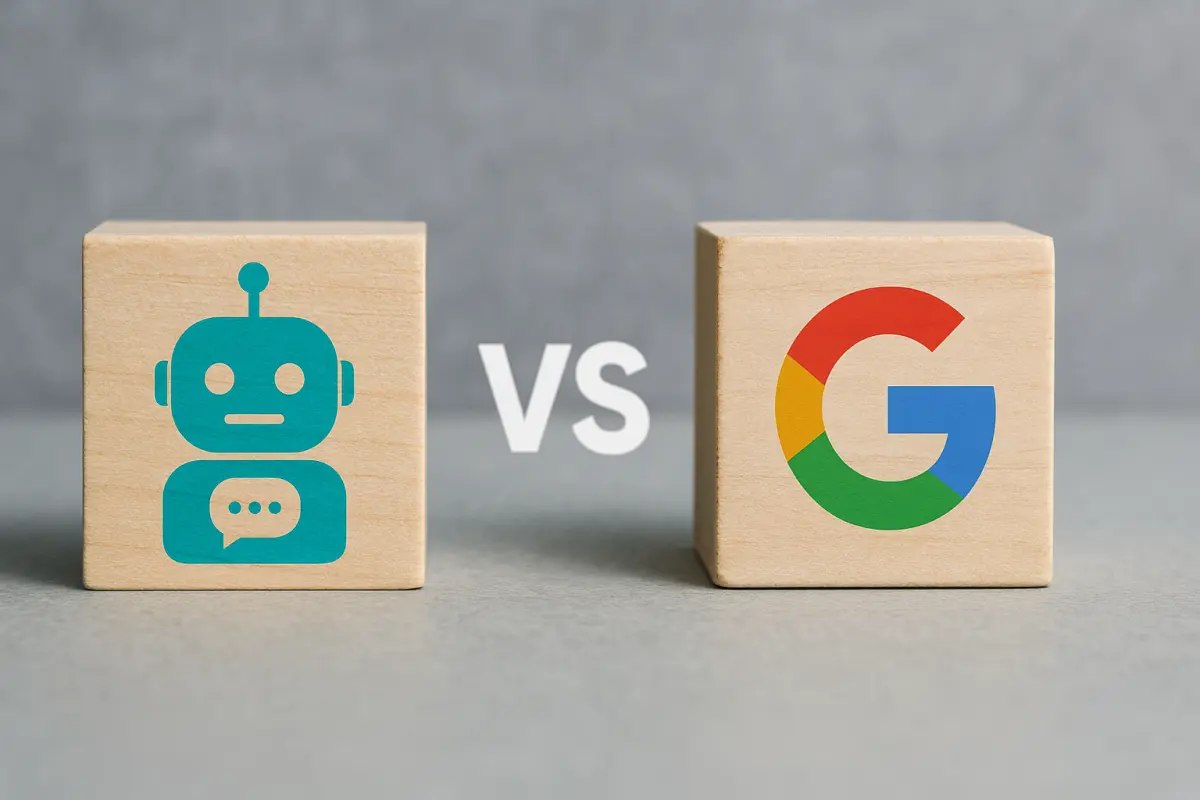Introduction: The New SEO Battlefield
The digital landscape is undergoing a seismic shift, with artificial intelligence (AI) chatbots rapidly emerging as significant players in how individuals seek and obtain information online. This evolution presents a direct challenge to the long-standing dominance of traditional search engines like Google, forcing businesses to reconsider their strategies for achieving online visibility. The increasing sophistication and widespread adoption of AI chatbots, such as ChatGPT, are fundamentally altering user behavior and expectations, impacting traditional search engine optimization (SEO) practices. Statistics reveal the substantial growth of this technology, with projections indicating that chatbot adoption is set to double within the next two to five years. This surge in popularity suggests a notable change in how users are approaching information retrieval, moving towards more conversational and direct interactions rather than sifting through lists of web links. This shift in user behavior is beginning to exert pressure on traditional SEO, necessitating a re-evaluation of established optimization techniques that have long been centered around achieving high rankings on search engine results pages. The rise of AI chatbots is not merely a technological curiosity; it represents a tangible diversification of the search landscape. Reports indicate a dip in Google’s market share, coinciding with an increase in traffic to AI-driven platforms. This suggests that businesses can no longer afford to rely solely on optimizing for Google if they wish to maintain comprehensive online visibility. A multi-faceted approach that acknowledges and addresses the growing influence of AI chatbots is becoming increasingly crucial. To thrive in this evolving environment, businesses must adapt their SEO strategies to align with these new realities. This includes understanding the nuances of how AI chatbots gather and present information, as well as the emerging field of Generative Engine Optimization (GEO), which focuses on optimizing content specifically for AI-powered platforms. GEO represents a fundamental shift in optimization, moving from a focus on traditional search engine algorithms to ensuring a brand’s information is surfaced and cited within AI-generated responses. Global Upscale recognizes this pivotal moment in the digital landscape and stands at the forefront of assisting businesses in navigating this “SEO battle.” With a deep understanding of the evolving roles of both AI chatbots and traditional search engines, Global Upscale is equipped to help companies optimize their online strategies for this new era. This report will delve into the rise of AI chatbots in search, analyze Google’s response to this growing competition through its own AI integrations, explore the necessary adaptations in SEO strategies, detail Global Upscale’s expertise and services in this domain, and finally, look ahead at the future trends shaping the intersection of AI and SEO.
The Rise of AI Chatbots in Search
The digital realm has witnessed a remarkable surge in the popularity and practical application of AI chatbots, positioning them as a significant force in the landscape of information retrieval. These sophisticated tools are increasingly becoming the primary point of contact for users seeking answers, guidance, and even entertainment online. The growing adoption rates are underscored by impressive statistics on market size and user engagement. Projections indicate a substantial expansion of the conversational AI market, with forecasts suggesting a rise from $10.7 billion in 2023 to nearly $30 billion by 2028. This exponential growth is mirrored in the sheer number of individuals now interacting with AI chatbots on a regular basis. Reports from early 2025 highlight that over 987 million people are actively using AI chatbots, a figure that continues to climb as the technology becomes more integrated into daily digital interactions. The increasing reliance on these platforms is further emphasized by the projected rise in chatbot adoption by businesses, with estimates suggesting a 34% increase by 2025. This widespread embrace by both consumers and enterprises signals a fundamental shift in how digital information is accessed and utilized. User engagement metrics further solidify the notion that AI chatbots are not merely a fleeting trend but a deeply integrated aspect of the online experience. A significant majority of individuals who have interacted with chatbots report having positive or neutral experiences, with satisfaction rates hovering around 87%. This positive reception is a crucial indicator of the value users are finding in these AI-powered interactions. Moreover, a considerable portion of users are engaging with chatbots multiple times a month, demonstrating a consistent reliance on these tools for various tasks and inquiries. The expectation for AI assistance is also on the rise, with a substantial percentage of customer service leaders anticipating that AI bots will be interacting with customers within the next few years. This growing comfort and reliance on AI chatbots are fundamentally altering established patterns of user behavior and expectations in the digital sphere. The instant and conversational nature of these tools is reshaping how individuals approach the process of seeking information. Traditionally, users would formulate keyword-based queries and navigate through a list of search results, often requiring multiple clicks and page views to find the desired answer. However, AI chatbots offer a more streamlined and direct experience. Users are increasingly adopting natural language prompts, posing questions in full sentences as if conversing with another person. This shift towards conversational search reflects an expectation for AI to understand context and provide nuanced, human-like responses. The ability of AI chatbots to offer immediate answers and engage in dialogue is fostering a generation of users who prioritize efficiency and personalized interactions over the traditional search engine model. This alteration in user behavior has profound implications for businesses, as it necessitates a move beyond conventional SEO strategies that were primarily designed to cater to keyword-based search engine algorithms.
Google’s Response – Integrating AI into Search
In the face of the rapidly growing influence of AI chatbots, Google, the long-standing leader in search, has been actively integrating its own suite of artificial intelligence features into its search engine. This strategic move underscores Google’s commitment to maintaining its dominance in the information retrieval landscape by adapting to the evolving role of AI. A key aspect of this response has been the implementation of advanced AI models, most notably Gemini, and the introduction of AI-powered features like AI Overviews. Gemini, described as Google’s most capable AI model, is designed to enhance the relevance and accuracy of search results by understanding the full context of user queries, even those that are complex or multi-faceted. This represents a significant evolution from traditional keyword matching, moving towards a more interactive and personalized search experience. Complementing Gemini, AI Overviews provide concise, AI-generated summaries at the top of search results for certain types of queries. These summaries aim to save users time and effort by offering a quick, digestible answer synthesized from multiple sources, along with links to those sources for further exploration. The integration of these AI features is having a notable effect on search dynamics and user engagement. Studies analyzing the impact of AI Overviews suggest a potential decrease in click-through rates for traditional organic listings. This indicates a shift in user behavior, where individuals may find the AI-generated summary sufficient and thus less inclined to click on the organic results that appear below. Data from early 2025 shows that AI Overviews are appearing in a growing percentage of searches, with some analyses indicating a presence in over 13% of all queries. This increasing prevalence suggests that businesses need to adapt their SEO strategies to account for this new reality, where prominent placement in an AI Overview might be as, or more, valuable than a top organic ranking for certain informational queries. Google’s long-term strategy to maintain its search dominance in the face of AI advancements appears to be centered on transforming its search engine into a comprehensive “answer engine”. This involves a deep integration of AI not only for generating summaries but also for understanding user intent, handling complex and multimodal queries, and providing a more conversational search experience.Google is emphasizing the importance of high-quality, authoritative content as the foundation for its AI-powered search results, suggesting that traditional SEO principles around creating valuable and trustworthy content remain relevant. Furthermore, Google is exploring ways to incorporate multimodal search capabilities, allowing users to search using a combination of text, images, and voice, further blurring the lines between traditional search and the conversational interactions offered by AI chatbots. This evolution indicates that SEO strategies must also adapt to focus on optimizing content across various formats to ensure visibility in Google’s increasingly AI-driven search environment.
SEO in the Age of AI – Adapting Strategies
The rise of AI chatbots presents a significant set of challenges to the conventional methods of SEO that businesses have relied upon for years. Traditional techniques, such as focusing heavily on specific keywords and striving for top organic rankings, may no longer be sufficient in a search landscape increasingly influenced by AI-driven platforms. The core issue is that AI-powered platforms prioritize providing direct answers and understanding user intent, often bypassing the need for users to click through to multiple websites. This shift diminishes the value of simply achieving a high ranking for informational queries if the answer is readily available within an AI chatbot’s response or Google’s AI Overview. To navigate this evolving landscape, businesses must embrace new strategies, most notably Generative Engine Optimization (GEO) and optimization for conversational search. GEO represents a fundamental shift in SEO, focusing on optimizing content for AI understanding and citation. Unlike traditional SEO, which targets search engine algorithms to improve rankings, GEO aims to ensure a brand’s information is accurately represented and included in the knowledge base and training sets of AI models. This involves understanding how AI models access, interpret, and synthesize information to generate responses. Optimizing for conversational search is another critical adaptation. As users increasingly interact with AI platforms using natural language queries, businesses need to tailor their content to match this conversational style. This means focusing on long-tail keywords and question-based phrases that mimic how users speak when interacting with AI assistants. To effectively optimize content for AI-driven search environments, businesses should consider several actionable tips. First, prioritize creating comprehensive, high-quality content that directly answers user questions in a clear and concise manner. Structure content logically using clear headings and subheadings to make it easily digestible for both humans and AI algorithms. Leverage structured data markup, such as FAQ schema, to help AI understand the context and purpose of different sections of your content. Emphasize E-E-A-T (Experience, Expertise, Authoritativeness, and Trustworthiness) by showcasing the credentials and expertise of your content creators and backing up claims with credible sources and data. Optimize for voice search by targeting long-tail, conversational keywords and ensuring your website is mobile-friendly and loads quickly. Finally, monitor how your brand is being represented in AI-generated responses and be prepared to adapt your content strategy based on these insights.
Global Upscale’s SEO Services – Your Partner in the AI Era
Global Upscale possesses a deep understanding of the dynamic and rapidly evolving SEO landscape, particularly as it is being reshaped by the emergence and increasing sophistication of artificial intelligence. Our team has closely monitored the trends and technological advancements in both AI chatbots and Google’s AI-powered search initiatives, positioning us as a knowledgeable and experienced partner for businesses navigating these changes. We recognize that the traditional rules of SEO are being rewritten, and we are at the forefront of developing and implementing strategies that ensure our clients not only remain visible but thrive in this new era. Global Upscale offers a comprehensive suite of SEO services specifically designed to address the challenges and opportunities presented by AI trends. Our approach goes beyond conventional SEO tactics, emphasizing adaptability and innovation to ensure our clients achieve optimal online presence in both traditional search engine results and AI-driven environments. We specialize in Generative Engine Optimization (GEO), understanding how AI models interpret and utilize content to generate responses. Our services include optimizing content structure and formatting to enhance its discoverability and usability by AI platforms. We also focus on crafting content that aligns with the principles of conversational search, targeting natural language queries and ensuring our clients’ messaging resonates with users interacting with AI assistants. Furthermore, we leverage structured data and schema markup to provide clear signals to both traditional search engines and AI systems, improving the likelihood of our clients’ content being featured in rich results and AI-generated summaries. Our team also possesses expertise in building and strengthening E-E-A-T signals, recognizing the increasing importance of experience, expertise, authoritativeness, and trustworthiness in the age of AI-driven information retrieval. We work diligently to ensure our clients’ content and online presence establish them as credible and authoritative sources in their respective industries. While we cannot share specific client names here, we have a proven track record of helping businesses across various sectors successfully adapt their SEO strategies to the evolving search landscape. Our case studies demonstrate measurable improvements in online visibility, engagement, and lead generation, even amidst the rise of AI-powered search. We have assisted clients in optimizing their content to be featured in Google’s AI Overviews, as well as ensuring their brand information is accurately and prominently presented in responses generated by AI chatbots. Our experience spans developing comprehensive content strategies, implementing technical SEO best practices tailored for AI understanding, and continuously monitoring and adapting our approaches based on the latest algorithm updates and AI trend analysis. We encourage you to reach out to Global Upscale to discuss your specific SEO needs and discover how our tailored solutions can help you navigate the complexities of the AI era and enhance your digital presence. Contact us today.
Looking Ahead – The Future of SEO
The landscape of SEO is poised for continued transformation, driven by the relentless advancements in artificial intelligence. Looking ahead, several key trends in AI are expected to further reshape how search engines function and how users interact with them. Natural Language Processing (NLP) will continue to evolve, enabling AI to understand and respond to human language with even greater nuance and accuracy. Multimodal search, which allows users to search using a combination of text, images, and voice, is also expected to become more prevalent, requiring businesses to optimize their content across various formats. Businesses need to proactively plan for these upcoming changes in the digital marketing landscape to ensure they remain competitive and visible to their target audience. This includes investing in creating high-quality, comprehensive content that caters to various search formats and aligns with the evolving capabilities of AI-powered search engines and chatbots. It also means staying informed about the latest algorithm updates and AI trends to adapt SEO strategies accordingly. Global Upscale is committed to remaining at the forefront of SEO innovation, continuously monitoring these trends and developing cutting-edge strategies to help our clients succeed in the future. Our vision is to provide our clients with the most effective and adaptable SEO solutions, ensuring they stay ahead of the curve in the ever-changing digital landscape. Explore our comprehensive SEO services at our website.
Key Takeaways for Businesses
- Adapting Your SEO Strategy: AI Chatbots vs Google:
- Focus on creating high-quality, comprehensive content that directly answers user questions.
- Optimize for natural language and long-tail keywords to cater to conversational search.
- Utilize structured data markup to enhance content understanding by both search engines and AI.
- Build and strengthen E-E-A-T (Experience, Expertise, Authoritativeness, and Trustworthiness) signals.
- Ensure your website is mobile-friendly and has fast loading speeds.
- The Importance of Integrating AI Chatbots for Modern SEO Strategies: Considering AI chatbots in your overall SEO strategy is crucial for comprehensive online visibility as a significant portion of information-seeking is now occurring on these platforms.
- How to Balance AI Chatbots and Google in Your Business Strategy for Maximum Visibility: Optimize your content not only for traditional Google search but also for the way AI chatbots access and utilize information, ensuring your brand is discoverable across both platforms. .
Conclusion: Stay Ahead with Global Upscale
The digital landscape is in a state of constant flux, and the rise of AI chatbots alongside Google’s own AI advancements represents a significant shift in how individuals seek and consume information online. Businesses that understand these changes and proactively adapt their SEO strategies will be best positioned to thrive in this new environment. The emergence of Generative Engine Optimization (GEO) and the increasing importance of conversational search highlight the need for a more holistic and AI-aware approach to online visibility. Global Upscale is your dedicated partner in navigating this complex landscape. Our expertise in both traditional SEO and the nuances of AI-driven search ensures that your business can effectively reach and engage your target audience across all relevant platforms. We invite you to explore our SEO services and case studies at our website to understand how Global Upscale can enhance your digital presence and help you stay ahead in the age of AI.



